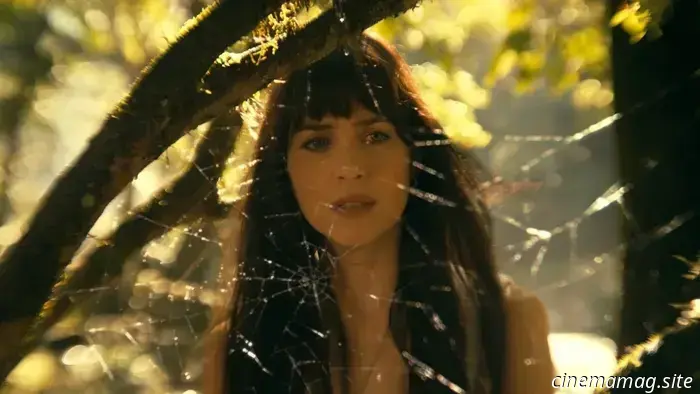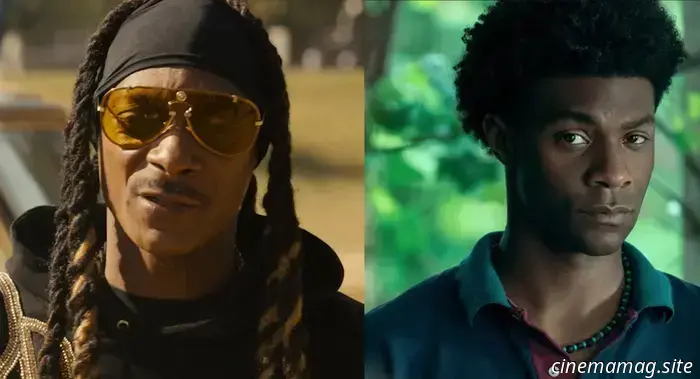
Emmanuelle Review: Audrey Diwan Transforms an Erotic Classic into a Strikingly Compelling yet Alienating Experience.
Note: This review was initially published as part of the U.K. release. Emmanuelle became available on VOD in the U.S. on June 6.
The most notable aspect of Audrey Diwan’s reinterpretation of Emmanuelle—the notorious novel-turned-softcore series from the uniquely named director Just Jaeckin—is that the original dramatic elements largely remain unchanged. This might explain the negative critical reception it received during its premiere at San Sebastian: audiences expecting a completely different, radically feminist perspective on this material from the filmmaker behind the Golden Lion-winning Happening may be let down by its unexpected fidelity to the source material. Diwan and co-writer Rebecca Zlotowski's recontextualization of this narrative also contrasts with the recent backlash among cinephiles regarding the lack of sexuality in modern cinema. Right from the opening scene, where Emmanuelle (Noémie Merlant) joins the mile-high club, the encounter is presented as dispassionately as her heroine’s blank expression, causing many viewers to check out of a film that strips away any hint of titillation or sensuality from what is fundamentally defined by such elements. Like this version of Emmanuelle, Diwan’s film feels disconnected from sexual desire, mechanically repeating many of the beats (and encounters) from material that was unapologetic about its sensuality.
This detached approach, portraying hedonism with the same enthusiasm one might have for filing taxes, is largely what I found fascinating about Emmanuelle. As a narrative about sexual exploration, it resonates less with its predecessors and more with works like Jonathan Glazer’s Under the Skin, where the very concept of sexual desire is shown as unfathomable and alien. The dreamlike quality that Diwan employs only amplifies this, elevating the expected traits of a lowbrow erotic drama—from the stilted, often cheesy, over-sexualized dialogue to the exoticized travel setting—into the realm of the uncanny. It’s a unique story of sexual discovery where the film itself, like its lead, seems to be grappling with the allure of what is unfolding onscreen.
In this version, Emmanuelle is employed by a multinational hotel company, traveling the world to inspect luxury hotels and terminate managers who fail to provide five-star treatment. During her time in Hong Kong, the brief glimpses of sexual encounters (such as a threesome with two other guests) are depicted in a dispassionate manner, as routine as brushing one's teeth. It suggests that scrutinizing the opulence few can access has drained Emmanuelle of enthusiasm in all areas of her life, with her lack of pleasure in the bedroom being merely the tip of the iceberg.
One might be tempted to interpret this as a subtle critique of film critics, a group that dissects flaws to the extent they siphon away their pleasure from the very thing that once captivated them. We live in an era where many voices express alienation from onscreen sex scenes, just as others call for an end to this notably unerotic period in cinema; Diwan’s method involves throwing viewers into a cold shower, only escalating the intensity once they’ve adjusted to the actions portrayed in a clinical, calculated manner.
For quite some time, I admit I viewed this take on Emmanuelle as more of an academic exercise rather than a concept that warranted a feature-length reboot. However, the coldly voyeuristic portrayals of sex, allowing viewers to observe without the risk of titillation, ultimately render the anticipated erotic moments feel newly surreal. By the time a mysterious hotel guest (Will Sharpe) appears, it wouldn’t have been shocking if Diwan revealed him to be merely a manifestation of Emmanuelle’s joyless subconscious; instead, he turns out to be an unusual twist on the softcore trope of the individual whose unrestrained sexual appetite positions them as a "teacher" to the protagonist. Like Rivers Cuomo, he is weary of sex and recounts past encounters at length despite having not concerned himself with such matters for years.
He often lurks in the hotel lobby or the upstairs corridors—though he’s the focus of much speculation due to never actually spending the night in his room—serving a narrative role akin to that of a ghost from past hookups rather than as a guiding figure. His presence is the one aspect where I couldn’t fully grasp the intentionality behind Diwan and Zlotowski’s vision. There’s a peculiar dry humor in having the ostensible male romantic lead of an erotic drama be celibate, and his role as a voyeur in the climax is clever, but he seems designed more to subvert the dramatic expectations of this type of narrative rather than to be a necessary part of it.
Nevertheless, despite the limited dramatic range that comes with an erotic drama focused on diminished sexual desire, I cannot deny that Diwan’s film struck me as oddly captivating. I may be the only person who views this as an improvement over her
Other articles
 Charlize Theron fights Veronica Ngo in a scene from The Old Guard 2.
With under a month remaining until the premiere of The Old Guard 2, a fresh clip has surfaced online from the action sequel, offering a glimpse of an intense battle between Andy (Charlize Theron) and Quynh (Veronica Ngô); watch it below… Andy (Charlize Theron) and her group of immortal fighters […]
Charlize Theron fights Veronica Ngo in a scene from The Old Guard 2.
With under a month remaining until the premiere of The Old Guard 2, a fresh clip has surfaced online from the action sequel, offering a glimpse of an intense battle between Andy (Charlize Theron) and Quynh (Veronica Ngô); watch it below… Andy (Charlize Theron) and her group of immortal fighters […]
 Dakota Johnson remains unaffected by the chaos surrounding Madame Web, stating, "It wasn't my fault."
Dakota Johnson does not think Madame Web is her fault, and that's her perspective as the film's leading actress. Johnson has been very open while promoting the Sony superhero movie, and even after its release, she continues to speak frankly. In an interview with the Los Angeles Times during her Materialists press tour, she discussed the significant shortcomings of Madame [...]
Dakota Johnson remains unaffected by the chaos surrounding Madame Web, stating, "It wasn't my fault."
Dakota Johnson does not think Madame Web is her fault, and that's her perspective as the film's leading actress. Johnson has been very open while promoting the Sony superhero movie, and even after its release, she continues to speak frankly. In an interview with the Los Angeles Times during her Materialists press tour, she discussed the significant shortcomings of Madame [...]
 Keanu Reeves' character B arrives at Walmart with a BRZRKR action figure created by McFarlane Toys.
McFarlane Toys has officially revealed the Walmart exclusive BRZRKR 7-inch deluxe action figure, modeled after the half-mortal, half-God character B from Keanu Reeves’ Boom! Studios comic series. This collectible can now be bought for $49.99; take a look at it here… A WAR WITH NO END. The individual known […]
Keanu Reeves' character B arrives at Walmart with a BRZRKR action figure created by McFarlane Toys.
McFarlane Toys has officially revealed the Walmart exclusive BRZRKR 7-inch deluxe action figure, modeled after the half-mortal, half-God character B from Keanu Reeves’ Boom! Studios comic series. This collectible can now be bought for $49.99; take a look at it here… A WAR WITH NO END. The individual known […]
 12 Films Ruined by Poor CGI
These films with poor CGI would have been better if they had relied on practical effects whenever they could.
12 Films Ruined by Poor CGI
These films with poor CGI would have been better if they had relied on practical effects whenever they could.
 Mikey Madison will take over Sydney Sweeney's role in A24's The Masque of the Red Death.
It seems that Oscar-winning Mikey Madison might have discovered her next role, as THR has reported that the Anora star is in discussions to headline the cast of A24’s reinterpretation of Edgar Allan Poe’s The Masque of the Red Death. This project is inspired by the 1842 short story, which depicts a deranged prince who hosts […]
Mikey Madison will take over Sydney Sweeney's role in A24's The Masque of the Red Death.
It seems that Oscar-winning Mikey Madison might have discovered her next role, as THR has reported that the Anora star is in discussions to headline the cast of A24’s reinterpretation of Edgar Allan Poe’s The Masque of the Red Death. This project is inspired by the 1842 short story, which depicts a deranged prince who hosts […]
 Jonathan Daviss is set to portray Snoop Dogg in a film.
Jonathan Daviss is set to portray one of the most iconic figures in music, as a biopic about Snoop Dogg is in development at Universal Pictures. According to a recent report from Deadline, Daviss will lead the cast of this upcoming film, which will be directed by Craig Brewer (known for Hustle & Flow and Coming 2 America). The film is being produced by Snoop […]
Jonathan Daviss is set to portray Snoop Dogg in a film.
Jonathan Daviss is set to portray one of the most iconic figures in music, as a biopic about Snoop Dogg is in development at Universal Pictures. According to a recent report from Deadline, Daviss will lead the cast of this upcoming film, which will be directed by Craig Brewer (known for Hustle & Flow and Coming 2 America). The film is being produced by Snoop […]
Emmanuelle Review: Audrey Diwan Transforms an Erotic Classic into a Strikingly Compelling yet Alienating Experience.
Note: This review was first published in relation to the U.K. release. Emmanuelle became available on VOD in the U.S. on June 6. The most notable aspect of Audrey Diwan’s reimagining of Emmanuelle—the notorious novel-turned-softcore franchise by the wonderfully named director Just Jaeckin—is that the core dramatic elements have mostly been preserved. This might explain why it received
